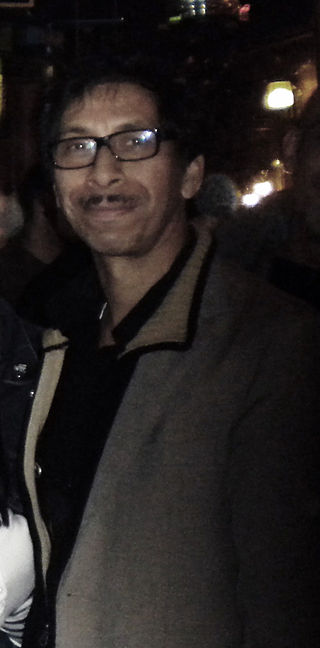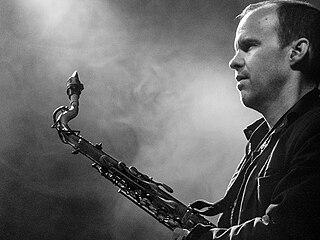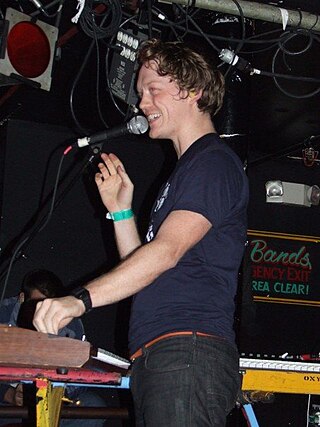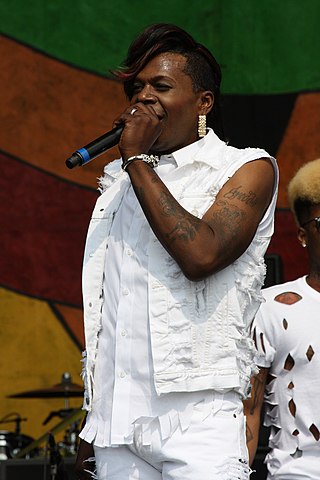
Disco is a genre of dance music and a subculture that emerged in the 1970s from the United States' urban nightlife scene. Its sound is typified by four-on-the-floor beats, syncopated basslines, string sections, brass and horns, electric piano, synthesizers, and electric rhythm guitars.

Yeah Yeah Yeahs are an American indie rock band formed in New York City in 2000. The group is composed of vocalist and pianist Karen O, guitarist and keyboardist Nick Zinner, and drummer Brian Chase. They are complemented in live performances by second guitarist David Pajo, who joined as a touring member in 2009 and replaced Imaad Wasif, who had previously held the role. According to an interview that aired during ABC's Live from Central Park SummerStage series, the band's name was taken from modern New York City vernacular.

Brian Tristan, better known by his stage name Kid Congo Powers, is an American rock guitarist, singer, and actor best known as a member of The Gun Club, the Cramps and Nick Cave and the Bad Seeds. He has also played with the Divine Horsemen, the Angels of Light, Die Haut, and Knoxville Girls.

Ahmir K. Thompson, known professionally as Questlove, is an American musician, record producer, disc jockey, filmmaker, music journalist, and actor. He is the drummer and joint frontman for the hip hop band the Roots. The Roots have been serving as the in-house band for The Tonight Show Starring Jimmy Fallon since 2014, after having fulfilled the same role on Late Night with Jimmy Fallon. Questlove is also one of the producers of the cast album of the Broadway musical Hamilton. He is the co-founder of the websites Okayplayer and OkayAfrica. Additionally, he is an adjunct professor at the Clive Davis Institute of Recorded Music at New York University.

Joe Bataan is a Latin soul musician from New York.

Clap Your Hands Say Yeah is the musical project of American singer, songwriter, and multi-instrumentalist Alec Ounsworth, active since the early 2000s in and out of Philadelphia.

David Banks, known by his stage name DJ Disciple, is an American DJ, house music producer and author from Brooklyn, New York. For much of his early career, he worked in London and was influential in the rise of UK garage music. Stateside, he was considered a cornerstone of New York City's house music scene. Disciple co-wrote the book The Beat, the Scene, the Sound: A DJ's Journey through the Rise, Fall, and Rebirth of House Music in New York City with Henry Kronk.

Chris Speed is an American saxophonist, clarinetist, and composer.

New York Noise is a one-hour indie-rock music video television program which aired from 2003–2009 on NYC Media in New York and parts of New Jersey and Connecticut. It was created, produced, and edited by Shirley Braha and funded by New York City under the Bloomberg administration. The show was "devoted to music videos, live footage, and high jinx from bands that ride the L train." According to The New York Times, it is "a groundbreaking show that has attracted a loyal following among musicians It is no longer in production since the station's rebranding in 2010, despite a petition and campaign which attempted to save it.

Erol Alkan is an English DJ and producer of Turkish Cypriot descent. He grew up in Archway in North London.
Dirty on Purpose were an American band from Brooklyn, New York, whose music was often described as indie pop or shoegaze.
Takka Takka is an American indie rock band from Brooklyn, New York. Performing since 2006, the band's members include Gabe Levine, Conrad Doucette, Rene Planchon and Craig Montoro.

"Think (About It)" is a funk song recorded by Lyn Collins and released as a single on James Brown's People Records in 1972. The recording was produced by Brown (who also wrote the song) and features instrumental backing from his band The J.B.'s. It was the title track of Collins' 1972 debut album. The song is very popular for its raw drumbeat dressed with tambourine and multiple background vocals, which suggest the song was recorded altogether in one take, with Jabo Starks playing drums. It peaked at No. 9 on the Billboard Best Selling Soul Singles chart and No. 66 on the Hot 100. Owing to the composition, it became a fan favourite and has been featured on various compilation albums posthumously. In the closing lyrics, Collins sings lines from "Think", which shows that this song was one of the few adaptations of the 5 Royales song that Brown loved to do. Think (About It) is among the most sampled songs of all time.

Robbie Guertin is a former keyboardist/guitarist/backup vocalist for the indie rock band Clap Your Hands Say Yeah and a drummer/vocalist for the band Radical Dads.

Freddie Ross Jr., better known by his stage name Big Freedia, is an American rapper and performer known for his work in the New Orleans genre of hip hop called bounce music. Freedia has been credited with helping popularize the genre, which had been largely underground since developing in the early 1990s.

Cassidy Durango Milton Willy Podell, known as DJ Cassidy, is an American DJ, record producer and MC.
Mister Saturday Night is a recurring party based in Brooklyn, New York. It is organized and DJed by Eamon Harkin and Justin Carter. The duo also runs an associated Sunday afternoon party called Mister Sunday. They have been referred to as "one of the city’s most accomplished DJ duos" by The Guardian. The party started in Santos Party House, a traditional Manhattan club, in early 2009, but left the club in May of that year and began hosting its events in non-traditional venues such as 12-turn-13. Mister Saturday Night offers an alternative nightlife experience that is "just as interested in constructing an engaging journey as they are in dropping good tunes." The party gives back to the community, announcing an initiative to donate ten percent of its annual net profits in 2014 to the Robin Hood Foundation, a poverty-fighting organization in New York.
The Cooler, a music and performance space, opened on Wednesday, September 22, 1993 at 416 West 14th Street in the Meatpacking District in Manhattan. The club showcased a wide variety of experimental music, Americana music, roots music, and spoken-word performers. Performances at The Cooler also included dance, film and video arts, and club parties. The Cooler blended live music, DJs, turntablists, and electronic dance music (EDM).

Soul Clap is an American DJ and production duo from Boston, Massachusetts. Active in the club scene since 2001, the group has released a number of mixtapes, EPs, singles, and albums. In 2012 they released their first album, EFUNK. According to XLR8R, Soul Clap "[tempt] the listener into the darker, more abstract corners of house by dressing them up with smooth, jazzy trimmings." The BBC wrote "they blend neon-splattered nostalgia with a crisp futurism thanks to their experimental production techniques."

Glasslands Gallery was a music venue, dance club, and art space in Williamsburg, Brooklyn. Glasslands was founded by Brooke Baxter and Rolyn Hu in 2006, as a relocation of Baxter’s earlier art space in the same building, Glass House Gallery. Hu and Baxter held the lease on the Glasslands space until 2012 when they made a turn-key sale to Rami Haykal and Jake Rosenthal of PopGun presents, who had been managing bookings since 2009, and day-to-day operations since 2010. PopGun owned the business and lease for two years until the venue was displaced to be converted into Vice Media‘s office headquarters. As a concert venue, Glasslands was one of the longest-running of several 2000s independent creative venue spaces in the vicinity of the Williamsburg waterfront, which included 285 KENT, Death By Audio, Secret Project Robot, Monster Island Basement, B.P.M., Live With Animals Gallery, the Rock Star Bar, and many others.
















